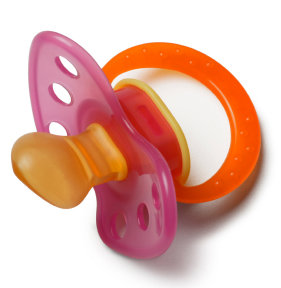Blog
When is a Child Too Old for a Pacifier?

As infants, babies have a natural tendency to suck on their thumbs and fingers while they are in the womb! Finger sucking is a way to explore their environment, make the child feel secure and happy, provide comfort in stressful situations, and even act as a sleep aid. However, is using a pacifier a better idea for your child? There is still a current debate over the positive and negative aspects of using a pacifier.
Pacifiers can be used to help comfort a baby, help them fall asleep, help distinguish between a hungry rather than a fussy baby, and even help with reflux. Nevertheless, using a pacifier especially prolonged use can result in difficulties with breast feeding, future dental issues, increased risk of ear infections, speech difficulties, swallowing difficulties, dependency on the pacifier, and even negative social impact with peers.
Most children wean off the pacifier before two years of age, however other kids continue to use them until age four or five! If your child has not yet given up his or her pacifier by age two, it is time to encourage them to stop using it. Breaking the pacifier habit is not always easy, however here are some methods parents can use to stop it. Some things you can do to reduce the use of the pacifier include:
- Keep the pacifier out of sight from the child and have them quit “cold turkey.”
-
Instead of scolding the child for thumb sucking, offer praise for not doing so.
- Designate certain short periods of time of the day for pacifier use. For example, during naps or at bedtime.
- Children often suck the pacifier when feeling insecure. Focus on correcting the cause of the anxiety and comfort the child.
- Spend time with other children who do not use a pacifier! Children learn from their environment therefore, if no other children are using a pacifier, your child will be less likely to use one.
- Gradually reduce the amount of time allowed for pacifier use. Not all children respond well to the cold turkey method, and a slow change may be more beneficial.
- Find other ways the child can comfort himself other than using the pacifier. Give them their favorite toy instead!
- Decrease pacifier use at monumental developmental stages. For example, when the child is learning to walk begin decreasing the availability of the pacifier.
It is important to remember the pacifier should never be a substitution for nurturing and attention towards your baby. Reward the child when he or she avoids pacifier sucking during a difficult period, such as being separated from family members. As a parent, always make sure to be patient and give your child love and praise for their decreased use of the pacifier! And always remember to make sure the pacifier is dishwasher safe, that way it can stay clean.
-Mallory Varrone MACF-SLP, TSSLD.




